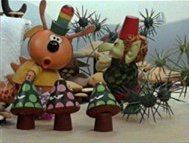Embracing the Cliche
Whenever I hear the phrase 'little old lady', it always takes me back to the children's series Chorlton and the Wheelies. Chorlton the dragon would refer to Fenella the witch as 'little old lady'. That's obviously a personal memory for me but I think it shows how powerful phrases can be in creating a picture, emotion or memory in us.
Many writing sites and courses talk about how terrible and lazy it is to use cliched phrases and to an extent they're right but the reason why so many of these phrases naturally arise in our writing is that they are ingrained into our psyche. In day to day conversation, we say that someone is 'blind as a bat' or a confusing instruction is 'as clear as mud'. These are sayings that have always surrounded us and so of course they will become part of our writing too.
I'm a great supporter of flow writing, writing non stop without editing. It can be difficult and make me very twitchy when my internal editor begins to poke me, but just getting the words down on paper can be invaluable in creating a first draft. This is the time when those phrases we see as cliched can jump in. Often a writer's gut reaction is to stop and muse over an alternative description or phrase. Don't. Leave that until your editing session. Get the piece written first.
Personally, I take great pleasure in seeing cliched phrases turned on their head. 'Once upon a time' may make us think of children's fairytales but it is often used as an indication of a struggle for a dream. This is excellently shown in the film 'Once Upon a Time in America', an epic crime film that tells the story of a group of Jewish ghetto youths from the 1920s up to 1968. The film includes no princesses in pretty gowns or helpful mice but the characters strive for something better, in their eyes a 'happy ever after'.
Taking a cliched phrase literally can have a pleasing effect. The phrase 'the butler did it' provided me with an idea for a murder mystery set in the 1920s about a family called the Butlers. Similarly 'Dead Gorgeous' has led me to a play about a beauty salon.
Cliched phrases may have been done and overdone but please do not dismiss them. They have value, if only in that they make us think and seek to improve our writing.
Many writing sites and courses talk about how terrible and lazy it is to use cliched phrases and to an extent they're right but the reason why so many of these phrases naturally arise in our writing is that they are ingrained into our psyche. In day to day conversation, we say that someone is 'blind as a bat' or a confusing instruction is 'as clear as mud'. These are sayings that have always surrounded us and so of course they will become part of our writing too.
I'm a great supporter of flow writing, writing non stop without editing. It can be difficult and make me very twitchy when my internal editor begins to poke me, but just getting the words down on paper can be invaluable in creating a first draft. This is the time when those phrases we see as cliched can jump in. Often a writer's gut reaction is to stop and muse over an alternative description or phrase. Don't. Leave that until your editing session. Get the piece written first.
Personally, I take great pleasure in seeing cliched phrases turned on their head. 'Once upon a time' may make us think of children's fairytales but it is often used as an indication of a struggle for a dream. This is excellently shown in the film 'Once Upon a Time in America', an epic crime film that tells the story of a group of Jewish ghetto youths from the 1920s up to 1968. The film includes no princesses in pretty gowns or helpful mice but the characters strive for something better, in their eyes a 'happy ever after'.
Taking a cliched phrase literally can have a pleasing effect. The phrase 'the butler did it' provided me with an idea for a murder mystery set in the 1920s about a family called the Butlers. Similarly 'Dead Gorgeous' has led me to a play about a beauty salon.
Cliched phrases may have been done and overdone but please do not dismiss them. They have value, if only in that they make us think and seek to improve our writing.



Comments
Post a Comment
Your comment will appear once it has been approved. Thank you for your interest.